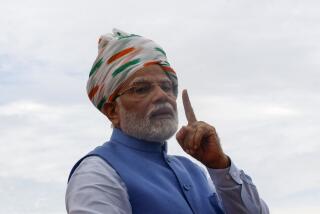British TV Fears Thatcher Wrath : Threat of Controls After Disputed Documentary
- Share via
LONDON — A highly controversial television documentary is likely to intensify government efforts to impose controls over the nation’s electronic media.
The 50-minute program, aired last Thursday, questioned the way in which members of an Irish Republican Army hit team met their deaths. It enraged Prime Minister Margaret Thatcher and senior members of her Conservative Party, one of whom demanded the abolition of the Independent Broadcast Authority (IBA), the organization responsible for commercial television in Britain.
The program, produced by the commercial network’s London regional outlet, Thames Television, challenged the government’s account of how specially trained British soldiers shot dead three unarmed IRA members in Gibraltar last March 6. The three are believed to have planned a bomb attack on a military parade there that is popular with tourists.
Although the government has claimed the soldiers fired in self-defense and only after the three made threatening movements, the Thames Television documentary recorded a series of eyewitnesses whose accounts appeared to undermine this explanation.
One witness interviewed claimed two of the would-be terrorists were shot after they had raised their hands in an apparent gesture of surrender.
After failing to block transmission of the documentary until after a coroner’s inquest scheduled for next month, Thatcher and her ministers assailed the program’s producers and the IBA for biased, irresponsible reporting.
“The place to have trials is in a court of law,” Thatcher said with unconcealed anger. “Trial by TV or guilt by association is the day that freedom dies.”
John Gorst, chairman of the House of Commons media committee and a member of Thatcher’s Conservative Party, stated flatly, “I would like to see the IBA abolished.”
Ostensibly, the government’s wrath was motivated by the belief that televised witnesses’ testimony could prejudice the inquest, which will be conducted with a jury.
But Thatcher’s anger was almost certainly exacerbated by her ministers’ failure to persuade the IBA chairman, Lord Thomson of Monifieth, a former Labor Cabinet minister, to postpone the transmission.
Over the past three years, Thatcher has successfully exerted her will over the British Broadcasting Corp. in a series of clashes.
Under intense government pressure, the BBC in August, 1985, took the unprecedented step of withdrawing a scheduled documentary on political extremism in Northern Ireland and agreeing to make changes before it was transmitted.
Early last year, a six-part documentary on the impact of Britain’s Draconian secrecy laws was also withdrawn under government pressure, and in a scene more evocative of Eastern Europe than Britain, police raided the BBC’s Glasgow studio and kicked down the front door of the series’ principal reporter’s home in search of program material.
The events have left the BBC shaken and, according to many corporation insiders, intimidated.
Although the IBA stood up to last week’s pressures to delay its controversial documentary, those who monitor government-media relations here suggest it may still pay a price for its victory.
They believe the episode is likely to encourage the Thatcher government to provide a new television standards watchdog committee with tougher statutory powers than initially envisioned.
The Broadcasting Standards Council is to be established in the next few months.
“This will make her determined to give the council some real teeth,” noted Raymond Snoddy, the Financial Times’ media correspondent.
The council was originally conceived last October to monitor television sex and violence as one of several measures taken by a shocked nation reassessing its values in the wake of the so-called Hungerford massacre, in which a crazed man killed 13 people before taking his own life.
Last month, Home Office Minister of State Timothy Renton appeared to extend the council’s responsibility to monitor “standards of good taste and decency” and enable it to comment on individual programs.
At the same time, the man expected to head the new council, former Times of London editor William Reese-Mogg, reportedly has insisted on the right to preview programs in advance of general transmission, a development strenuously opposed by both the BBC and the IBA.
There is also a belief that the episode could convince Thatcher that government proposals for the restructuring of Britain’s commercial television, due to be published later this year, should be shaped to divide the entity into many independent fragments to diffuse the strength of any one element.
So far, Thatcher has made no reference to such moves, but the severity of her reaction to the Thames Television documentary has left many in the industry concerned.
Warned Thomson in a recent newspaper interview:
“The government would be very wrong if, because of its anger, it seeks to undermine one of the more notable institutions--that is a real public-service broadcasting system.”
More to Read
Sign up for Essential California
The most important California stories and recommendations in your inbox every morning.
You may occasionally receive promotional content from the Los Angeles Times.













